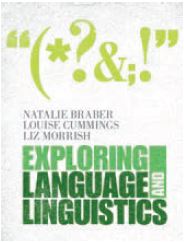Background books - Exploring Language and Linguistics
Exploring Language and Linguistics
Natalie Braber, Louise Cummings and Liz
Morrish
Cambridge University Press 2015

Exploring Language and Linguistics aims to provide ‘first year undergraduates taking their first course in linguistics’ with a good overview of the field. However, it provides so much useful information that I would urge the publishers to cast their net wider and publicise the book to other student groups.
Students on postgraduate TEFL and TESOL courses often have a lack of knowledge of linguistics. They may have a background in mainstream education or worked as a TEFL teacher, but hardly any have a first degree in Applied Linguistics and are unfamiliar with the metalanguage employed by their lecturers and supervisors. If they are to maximise their learning potential on a fast-moving postgraduate course and produce high-quality writing, they need to be able to use linguistics terminology in its appropriate context. Exploring Language and Linguistics is precisely the book that they will need for both the broad brush strokes and the specific details.
The book is organised into 17 chapters, each written by a different author or authors. The first chapter, by Liz Morrish, is a lively introduction to the fundamentals of linguistics, and provides a good overview for the rest of the book. Chapters 2 to 7 examine the nuts and bolts of language, one aspect at a time. These chapters are organised in a logical sequence from the micro to the macro levels of language systems, starting from phonetics, and moving up to phonology, morphology, grammar, syntax and semantics. Chapters 8 to 17 cover various schools of linguistic thought, such as pragmatics, discourse analysis, historical linguistics, sociolinguistics, and psycholinguistics. I particularly enjoyed Helen Goodluck’s chapter on Child Language Acquisition, which covers the Chomskian theory of universal grammar in a clear and comprehensible way, while also giving space to competing theories.
My only concern with the book’s choice of subject matter is that Systemic Functional Linguistics (SFL) does not have a chapter to itself, although it is mentioned in the chapter on Language and Ideology. As author Lesley Jeffries points out (p380), this chapter uses many insights from SFL, but these insights are not clearly distinguished from other schools of thought, such as Text World Theory. Separate sections, if not chapters, would allow readers to compare and evaluate the theories more easily.
Each chapter is divided into short digestible sections, with handy Key Terms boxes: a useful resource for exam revision. There are also boxes containing concept-checking exercises, which are designed to help students apply theoretical concepts to real situations. These are useful for beginners, who often find the subject overly theoretical and abstract. To round things off, each chapter ends with a summary: another useful aid to revision. As you would expect in an entry-level textbook, there are also plenty of diagrams, tables and visual representations of the important concepts. There is also a comprehensive glossary and a very thorough index. Finally, and very importantly, there are blank pages at the back for note-taking. If only all entry-level textbooks were written in such a clear and comprehensible style, then learning complex jargon-laden subject matter would be made much easier!
Online resources are also available and free of charge and include audio files, questions and group exercises to encourage students to explore a topic further. For example, in Louise Cummings’ chapter on Pragmatics, the website tie-in directs students to an authentic dataset of dialogues with a child who has pragmatic disorder. A set of questions directs the students to evaluate the dataset and discuss it in groups. This kind of practical discussion-based activity is useful for breaking up long lectures, which many students find tiring and demotivating. Answers to the online activities can be found in the Instructor Resources, which are ‘locked’ but can be accessed via a relatively straightforward registration process.
Exploring Language and Linguistics is a well-thought-out one-volume package, with an excellent blend of coverage, depth and accessibility. The book should find a place in any staff resource room and would make excellent supplementary reading for EFL trainees. If, like me, you are a teacher rather than a language theorist and you don’t really know your discourse theory from your pragmatics, then this is the perfect place to start.
Terri Edwards is currently a Teaching Fellow in the English Language Centre at Durham University.

Comments
Write a Comment
Comment Submitted